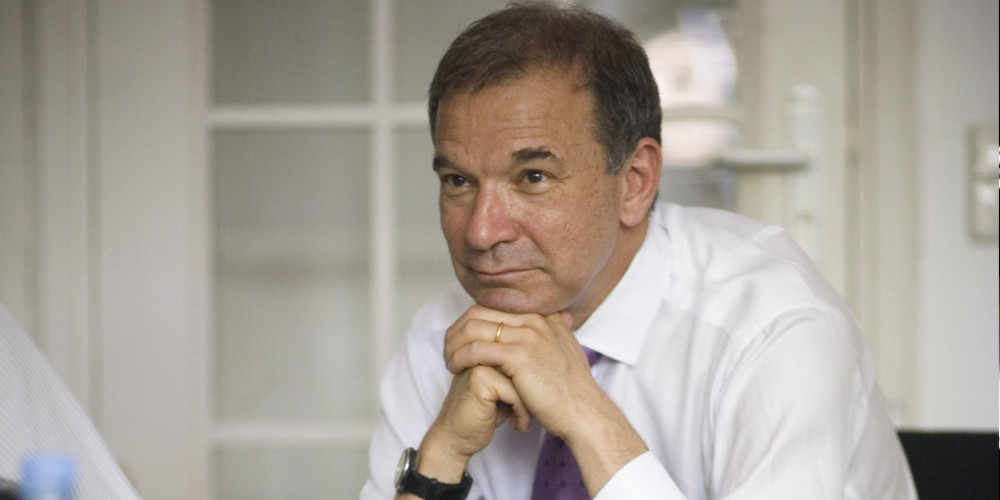Facets of Stephen

by Luca Giuliani
I shall certainly not attempt to give you a full picture but at least a glimpse of three different facets of Stephen.
Facet 1) The voice. You will hear Stephen’s voice in a moment, but he will simply speak and not sing. Singing and playing the guitar – this is something he gave up a long time ago. But before abandoning this avocation, he used to sing not only for his own enjoyment but perform in public as well. Among those he performed with was Art Garfunkel no less. Had the two continued as a duo then they would have been “Greenblatt & Garfunkel.” This would have left Paul Simon jobless; but who knows, Simon might have become a Shakespeare scholar and Fellow of the Kolleg. But there’s no need to explore such counterfactual possibilities, for my subject tonight is not Simon but Stephen. What does this episode tell us about him? Two things: a) from an early age Stephen had a keen interest not only in performance as such but in different kinds of audiences; and b) he seemed to consider entertainment not as something disgraceful and to be shunned, like most scholars, but as a challenge.
Facet 2) Anecdotes. In the early 1980s at Berkeley, Stephen was at the center of a movement that was labeled “New Historicism.” This has often been interpreted as a theory or a method – to my mind it was neither; it was instead a tidal wave that swept across the discipline and changed its landscape forever. New Historicism reacted against a conventional, narrow and purist approach to literary studies – an approach whereby literature was interpreted solely within literary parameters and never trespassing its self-imposed boundaries. Now, as many of you might know, it is a difficult thing to prevent Stephen from trespassing boundaries. In 2003-2004 he was here at the Kolleg convening a focus group on “Cultural Mobility.” This catchphrase, more than anything else, was expressive of a certain self-understanding on Stephen’s part. If we look at his scholarly work from the years around 1980, a pattern emerges. For instance his paper on Shakespeare’s Twelfth Night. In it Stephen starts with a historical anecdote – a juridical inquiry in 1601 into the case of a love affair between two women where one of them turned out to be a man – a case of hermaphroditism. The two wanted to marry, thus instigating the judicial inquiry. After reciting this anecdote Stephen then examines contemporary medical theories on the similarities and differences between female and male sexual organs. This as well as the anecdote was far outside the purview of colleagues in literary studies who were listening to the talk. After treating such exotic material Stephen then proceeds to an analysis of Shakespeare’s play, offering an interpretation that is as coherent as it is surprising, unfamiliar evidence being marshaled to shed new light on a familiar text, bringing it to life. Reading the paper today, one still feels its excitement and captivating force.
Facet 3) Anecdotes again, but of a different kind. At the end of Renaissance Self-Fashioning (1980, pp. 255-57), Stephen tells of a flight he once took from Baltimore to Boston. He found himself sitting next to a man who “was traveling to Boston . . . to visit his son who was in hospital. A disease had impaired his son’s speech, so that he could only mouth words soundlessly, and he had, still more seriously, lost his will to live. The father was going, he told me, to try to restore that will, but he was troubled by the thought that he would not be able to understand the son’s attempts at speech. He had therefore a favor to ask me: would I mime a few sentences so that he could practice reading my lips? Would I say, soundlessly, I want to die?” Stephen, as it turns out, finds himself incapable of uttering these four words. This leads to a meditation on “the extent to which our identity and the words we utter coincide”; there is a close relation between self-fashioning, constructing one’s own identity and being, quite simply, alive, not only in the Renaissance but in the late 20th century. In this anecdote the narrator himself takes center stage. Personal anecdotes are also to be found in Stephen’s later books – though usually not in the epilogue but the prologue. The intense presence of Stephen in his writings is something that I find characteristic; if one reads a text of his, one hears the very sound of his voice. At the same time, by inserting himself into his own writings, he also creates an added dimension for the reader to muse upon. After all, how many of us would not share Stephen’s reluctance in saying “I want to die”? (Particularly at 30,000 feet.) This creates a strong bond between the writer and his audience. And it is this appeal to a broader public which helps explain why some of his later books have become bestsellers and earned prestigious awards such as the Pulitzer Prize. The roots of this are quite clearly detectable as far back as 1980.